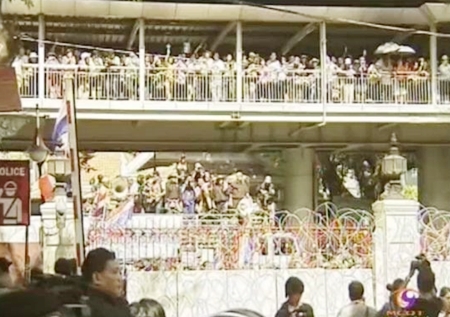BANGKOK, Nov 28 – Thailand’s anti-government movement today rejected Prime Minister Yingluck Shinawatra’s call to end their rallies and come to the negotiating table, saying the move was aimed to keep her government in power.
Anti-Amnesty Bill and Anti-Thaksin Regime Group spokesman Ekanat Prompan announced the group’s stance following the premier’s national televised address this afternoon.

He said the premier repeated her call in rejecting people’s demand to eradicate the so-called Thaksin regime.
Mr Ekanat said the group would not enter talks with the government as it is insincere and that the talks will unlikely find any solution.
He said the protest site at Democracy Monument on Ratchadamnoen Avenue will continue in parallel with the two new rally stages at the Finance Ministry and the Government Complex in Chaeng Wattana Road.
The former Democrat MP stated that the anti-government protests are peaceful and unarmed. At the Government Complex, civil servants can continue working despite the occupation of protesters.
Meanwhile, protesters from the so-called People’s Army to Overthrow the Thaksin Regime today rallied outside the headquarters of National Police Bureau in downtown Bangkok.
It is reported that an ill-intentioned group of people cut off electricity on Henri Dunant Road to cause a blackout in police headquarters.
Centre for the Administration of Peace and Order (CAPO) spokesman Pol Maj Gen Piya Uthayo said the power blackout has affected 414 patients in the nearby Police General Hospital. Police are now hunting for those responsible.
In a related development, the Interior Ministry reported that anti-government demonstrators are gathering outside 14 provincial halls nationwide, most of them were in the southern region and Nakhon Ratchasima in the Northeast, Nakhon Sawan in the Lower North and Rayong in the East.
Only in Surat Thani, where some protesters intruded into the provincial hall, the authorities have successfully talked them out of the premises. There are no anti-government demonstration at provincial halls in 61 provinces.




